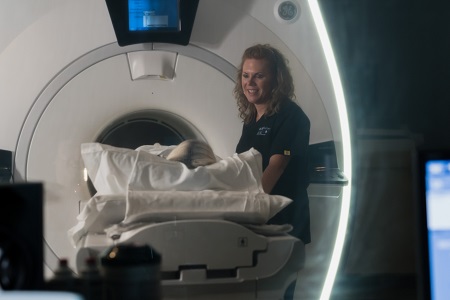MRI (Magnetic Resonance Imaging) is a non-invasive diagnostic procedure to image internal body structures using a magnetic field and pulses of radio frequency energy waves. Hundreds of images create a three dimensional detailed anatomical image without
use of damaging radiation.
MRI imaging is well suited for imaging of non-bony parts and soft tissues. In particular, the brain, spinal cord, nerves, muscles, ligaments, tendons, solid organs (kidney, liver, spleen, pancreas, uterus), and
hollow organs (stomach, small bowel, colon) are seen much more clearly compared to CT or regular X-rays.
Before your appointment

- Some patients maybe asked for a urine sample for a pregnancy test. As with most imaging tests, pregnant women and their doctors should discuss the risk of having the test while they are pregnant.
- Speak with your doctor if you have a fear of enclosed spaces (claustrophobia). Your physician may prescribe a mild sedative.
- Always discuss allergies with your doctor, especially if your MRI will include a contrast dye. The contrast material used in the MRI does not contain iodine, and it is unlikely to cause an allergic reaction, but notify your physician if you have allergies
to food or drugs, hay fever, allergic asthma, or get hives.
- The radiologist should also know if you have any serious health problems. Some conditions, such as kidney disease and sickle cell anemia, may prevent you from having an MRI with contrast material.
- As with all imaging tests please leave jewelry at home. Metal items and electronics are not allowed in the exam room because they interfere with the magnetic fields of the MRI.
Please do not bring:
- Jewelry, watches, credit cards and hearing aids, all of which can be damaged.
- Pins, hairpins, metal zippers and similar metallic items, which can distort MRI images.
- Removable dental work.
- Pens, pocketknives and eyeglasses.
- In most cases, an MRI exam is safe for patients with metal implants, except for a few types.
Tell the technologist if you have medical or electronic devices in your body, such as:
- Artificial heart valves.
- Implanted drug infusion ports.
- Implanted electronic devices.
- Artificial limbs or metallic joint prostheses.
- Implanted nerve stimulators.
- Metal pins, screws, plates or surgical staples.
In general, metal objects used in orthopedic surgery pose no risk during MRI. However, a recently placed artificial joint may require the use of another imaging procedure. If there is any question, an x-ray may be taken to detect the presence of any metal objects. Sheet metal workers and others who might have metal objects such as shrapnel in their bodies may also require an x-ray prior to an MRI. Dyes used in tattoos may contain iron and could heat up during MRI, but this is rarely a problem.
People with the following implants cannot be scanned and should not enter the MRI area:
- Cardiac pacemakers.
- Defibrillators.
- A cochlear (ear) implant.
Please consult with your physician for alternatives.
Click here for Exam Prep


